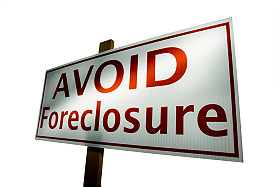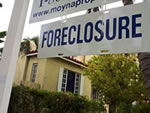Foreclosures
Foreclosure News Items
California seeking 'Homeowner Bill of Rights'
by Broderick Perkins
(3/5/2012) - California's attorney general and a host of Golden State legislators are pushing to secure a Homeowner Bill of Rights designed to protect homeowners from abusive mortgage practices and help crushed communities recover from the foreclosure crisis.

The move capitalizes on the $25 billion National Mortgage Settlement's provision that allows states to press mortgage lenders for greater redress arising from foreclosure abuses exacted by mortgage lenders and servicers after the housing market crashed.
"When I secured the California commitment, I made clear it was only one of many steps I am taking to comprehensively address the mortgage and foreclosure crisis," said Attorney General Kamala D. Harris.
The bill of rights is comprised of six pieces of legislation, each designed to tackle specific issues arising out of the devastation caused largely by toxic mortgages.
California is one of the nation's hardest-hit states, suffering high levels of foreclosures and personal financial suffering.
"California communities and families are being devastated by the mortgage and foreclosure crisis. We must ensure the deceptive practices that caused it never happen again," said Attorney General Harris.
"The California Homeowner Bill of Rights will provide basic fairness and transparency for homeowners, and improve the mortgage process for everyone," she added.
Not everyone supports the effort. Some early critics see the legislation as heavy handed.
"To me it looks like swinging the pendulum a little too much the other way. While I am all about consumer protection, this bill, if passed will further dent real estate recovery by delaying the foreclosure process by several months. Also, if there are any fees imposed on the banks, it would eventually get passed on the consumers one way or the other," said Shashank Shekhar, CEO of Arcus Lending, a San Jose, CA mortgage lender.
Harris conceded she expects strong opposition. Earlier this week, she asked Freddie Mac and Fannie Mae to temporarily suspend all foreclosure sales statewide. She said "a good-faith pause" is needed following the recent multi-s tate settlement with the nation's largest lenders over mortgage abuses.
Another expert warned, while the bill of rights can help stop banks from engaging in abusive foreclosure behavior, pushing mortgage lenders too hard could cause them to push back.
"If you become too draconian in California, the lenders will choose to cut down on new mortgages or just pass these fees onto new borrowers," warned John Pinto broker owner of Realty World, John V. Pinto & Assoc.
Others were quick to throw support behind the effort.
ReFund California, a coalition of nearly 50 different community, faith, labor, consumer rights and human service organizations "working to make Wall Street banks pay for destroying jobs and neighborhoods with their greedy, irresponsible and predatory business practices," issued supportive statements from member organizations.
"The passage of the Homeowner Bill of Rights package and an immediate halt to foreclosures will protect homeowners while the process for real relief runs its course. In the coming months, ACCE will be fighting for a swift and fair implementation of this month's multi-state settlement and a broader investigation and prosecution that will result in principal reduction for underwater homeowners," said Vivian Richardson, a member of the Alliance of Californians for Community Empowerment (ACCE), a ReFund coalition member.
Legislative highlights of the "Homeowner Bill of Rights" include:
Assembly Bill 1602 | Senate Bill 1470 - The Foreclosure Reduction Act of 2012
• Require creditors to provide documentary evidence of ownership to establish the creditor's right to foreclose on real property, prior to recording a notice of default; provide documentation of the chain of title to real property and the right to foreclose, at the time of the filing of a notice of default.
• Prohibit creditors from recording a notice of default when a timely-filed application for a loan modification or other loss mitigation measure is pending.
• Prohibit creditors from recording a notice of sale when 1) a timely-filed application for a loan modification or other loss mitigation measure is pending and 2) while a borrower is in compliance with the terms of a trial loan modification or after another loss mitigation measure has been approved.
Assembly Bill 2425 | Senate Bill 1471 - Due Process Reform
• Require creditors to provide a single point of contact to borrowers in the foreclosure process. Contact will be responsible for providing accurate account and other information related to the foreclosure or other loss mitigation process.
• Require creditors to provide a dedicated electronic mail address, facsimile number and mailing address for borrowers to submit information requested as part of any loss mitigation option.
• Authorize borrowers to challenge the unlawful commencement of a foreclosure process in court.
• Impose a $10,000 civil penalty on the recordation or filing of "robo-signed" documents, documents with information not personally verified for accuracy.
• Require that certain documents be recorded in a county recorder's office.
Assembly Bill 2314 | Senate Bill 1472 - Blight Prevention
• Prevent blight enforcement actions from being taken against new purchasers of blighted property for 60 days, provided that repairs are being made to the property.
• Require banks that release liens on foreclosed property to inform local code enforcement agencies of the release so that demolition of blighted property can proceed.
• Increase fines against owners of blighted property from $1,000 per day to $5,000 per day, and allow the imposition of the costs of a receivership over blighted property to be imposed directly against the owner of blighted property.
Assembly Bill 2610 | Senate Bill 1473 - Tenant Protection
• Require foreclosed home buyers to honor the terms of existing leases and give tenants at least 90 days notice before commencing eviction proceedings.
Assembly Bill 1950 - Enhancement of Attorney General Enforcement
• Impose a new $25 fee to be paid by servicers upon the recording of a notice of default. The fee would be deposited into a real estate fraud prosecution trust fund that would support the Attorney General's efforts to deter, investigate and prosecute real estate fraud crimes, including the work of the AG's Mortgage Fraud Strike Force.
• Extend the statute of limitations from one year to four years from the date of discovery for violations of law commonly occurring in connection with foreclosure-related scams, including acting as a real-estate agent without a license and charging up-front fees for loan modification services.
Senate Bill 1474 | Assembly Bill 1763 - Attorney General Special Grand Jury
• Authorize the Attorney General to impanel a special grand jury for the purposes of investigating and indicting multi-jurisdictional financial crimes against the state.
More Related Articles:
National mortgage settlement scams surface before official settlement signed
4.5 million get 90-day foreclosure review extension
Obama budget proposes extension on Mortgage Debt Relief Act
No help from HAMP? Refinance your mortgage to lower costs
HAMP modification program expanded to reach more underwater homeowners
State of the Union Address offers little for housing market

